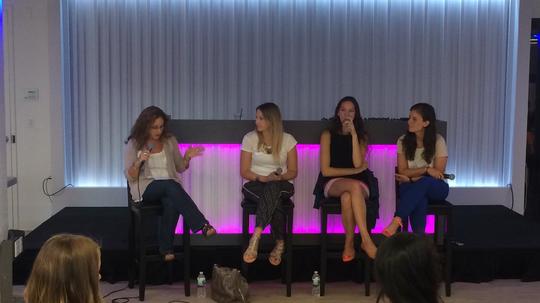
Aspiring women entrepreneurs from the local crop of universities headed late last week to Fort Point startup hatchery Blade to talk about the trials and tribulations of raising capital as a female founder. Put on by Blade Co-founder and CEO Paul English and Julia Austin, former VMware vice president and Blade’s newest Entrepreneur-in-Residence, the event centered around a stacked panel of successful women startup CEOs.
Moderated by Austin, the lineup of ladies, which featured Anna Palmer of Fashion Project, Kit Hickey of Ministry of Supply, and Polina Raygorodskaya of Wanderu, provided thoughtful reflections on their experiences securing their first checks and building their respective businesses.
Find your catalyst.
Palmer recalled that she met one of Fashion Project’s first advisors and investors – former Facebook Co-founder Andrew McCollum – during a mentoring session at Boston’s unConference. “I arrived really early to sign up to speak with him,” Palmer said, adding that she wanted to meet McCollum not only for his expertise, but also for his many connections within the industry itself. “You want to find a catalyst who can introduce you to investors and other advisers who could be helpful as you grow,” shared Palmer.
“If it doesn’t feel great Day One, it’s not going to feel good on Day 100." – @AnnaBPalmer of @FashionProjct
Don’t pitch your “reach investor” first.
“It’s a learning in progress thing...You don’t want to do your first pitch with your ‘reach school,’” explained Raygorodskaya, making a comparison between investor meetings with college applications. Instead, aim to meet with someone a little lower first, and regardless of who you speak with, make sure to follow up on the No’s. “Take the time to ask why it’s not a good fit, and use that to update pitches and address in the future,” posited Raygorodskaya, “It’s best to tackle that issue in the beginning,” as opposed to trying to do so while getting grilled post-pitch with your “dream investor.”
“People matter.”
It’s important to remember that there needs to be a good fit between the investor and the company itself, the trio of women echoed.
During the first months of Ministry of Supply, Hickey explained that the team had to pitch potential investors on the hypothesis that people were interested in wearing performance-inspired professional clothing. As a product company, they needed funding to produce clothes in the first place, and show viability. “When we were early stage, we were really looking for investors that really bought into the team, and could provide that support,” Hickey explained.
In the case of Fashion Project, Palmer stated that they were unflinching when it came to compromising on the overall mission of the socially-minded designer clothing donation startup. If an investor questions the percentages of each sale given to charity and kept by the company, “I have to immediately check them off my list, because it’s never going to work,” said Palmer. “People matter.”
“When you add an investor, it’s like you’re getting married for the life of the company,” said Raygorodskaya of finding good investor matches for bus and train travel booking site Wanderu. “All the prestige in the world wouldn’t matter to me if I didn’t get along with them as a person.”
“Growth and comfort don’t co-exist.”
Sometimes, what started out seeming like an acceptable fit won’t end up being one, whether you’re talking investors, fellow founders or teammates. Palmer recounted that the company caught one of its printing vendors stealing money. “If it doesn’t feel great Day One, it’s not going to feel good on Day 100,” said the CEO.
“Everything that doesn’t happen, happens for the best,” shared Raygorodskaya, quoting a Russian saying. Saying goodbye and quitting a company, for example, may be tough in the moment, but “where you are now is ultimately much better than where you would have been.”
“Growth and comfort don’t co-exist,” Hickey said. Every time you make a tough decision – and as a first-time founder, there are going to be a lot of them – you’re growing as a person. “The hardest times are when we really grow the most,” she added.
Have any other tips to share? Let us know in the comments below.
Image via Paul English








